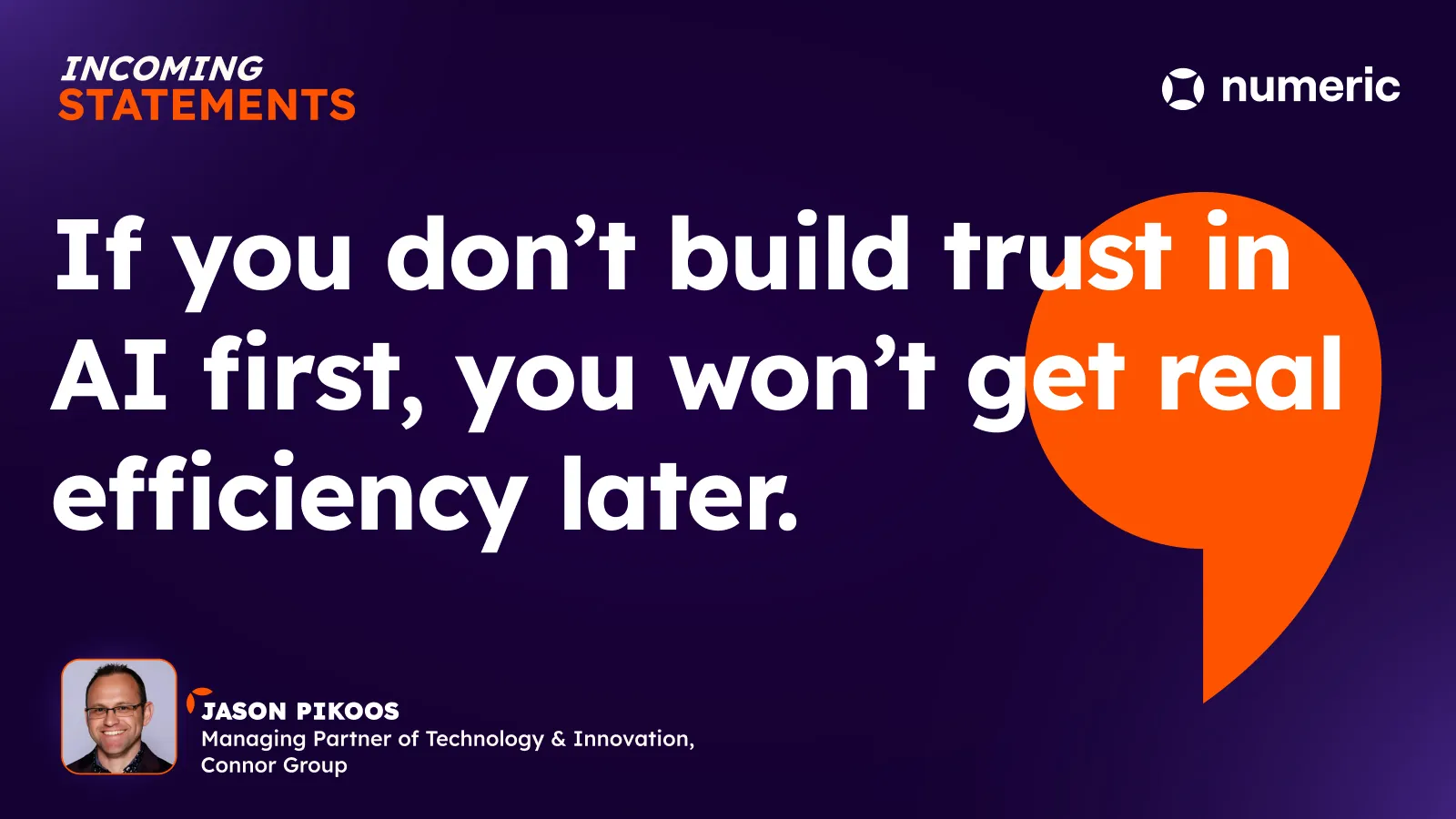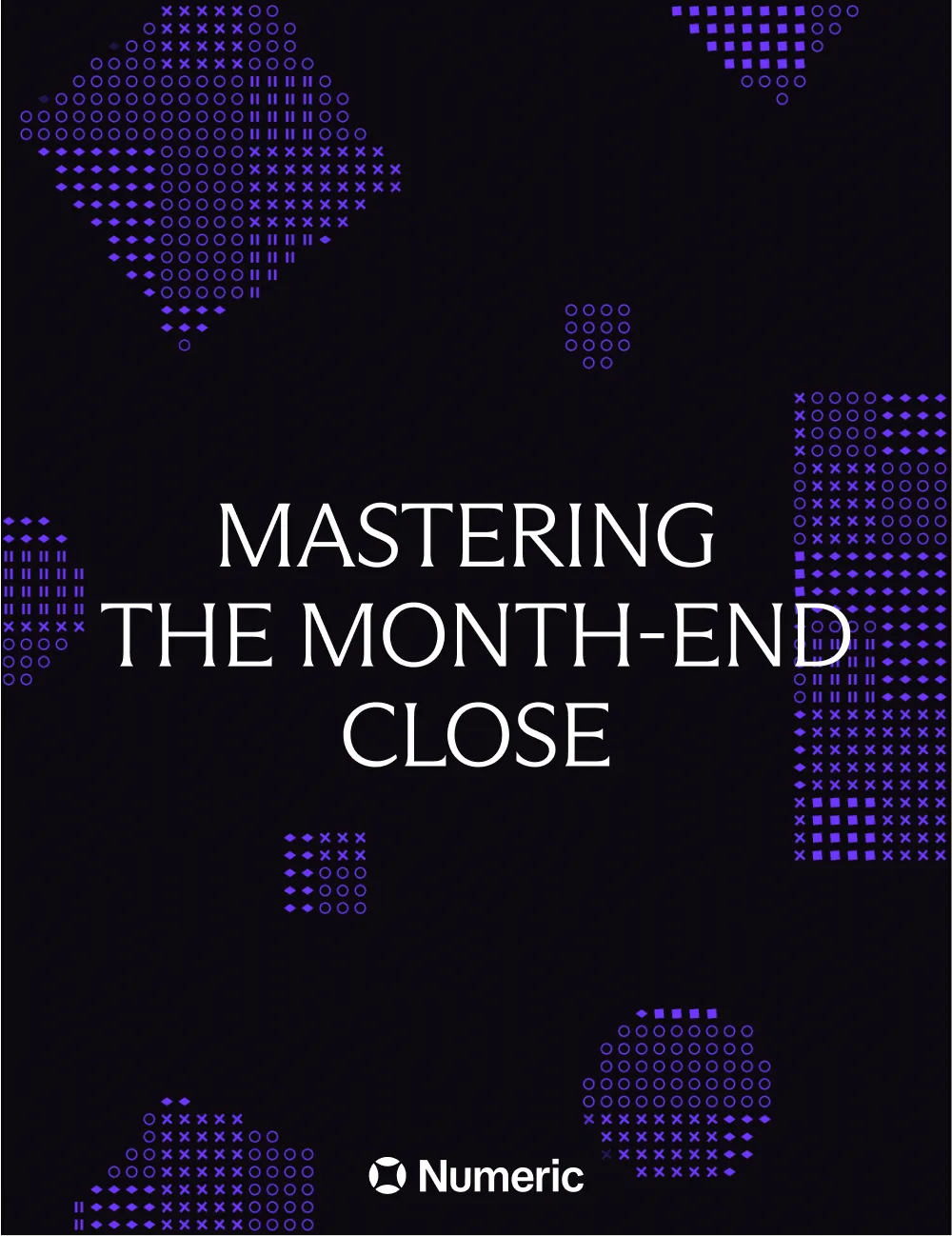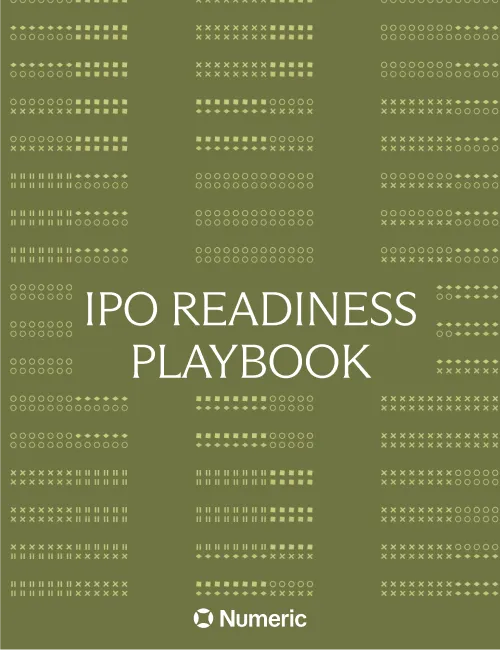Numeric's Complete Guide to AI for Accountants
.webp)
It's time to get intelligent about artificial intelligence.
Beyond traditional CPA skills, AI acumen is becoming essential for accounting professionals both now and in the future. We're past the buzzword phase – it's clear that AI is not only here to stay, but will shape the accounting industry and financial operations for years to come.
No matter your level of expertise, this guide is intended to be a go-to resource for essential AI knowledge that's tailored for accounting teams.
Is AI Going to Replace Accountants?
In short, no. Despite the clamoring about AI-induced job obsolescence, AI systems will not fully replace the accounting profession writ-large nor human accounting teams.
Instead, AI-powered tools are positioned to become “superpowered assistants” for accountants, helping to streamline the time-consuming and repetitive tasks they often dislike. With these advancements, accountants can turn to focusing on more strategic decision-making, such as financial planning and cash flow analysis.

The Impact of AI on Accounting
- AI will transform preparers into reviewers, handling routine tasks like data entry, bookkeeping, and standard calculations.
- AI will help accountants reach insights faster by quickly analyzing large amounts of data at speeds that far outstrip human effort and greatly reduce the risk of human error.
- AI will assist overworked accountants in addressing the industry's talent shortage.
To learn more about how humans + AI will work in tandem rather than in opposition, read our guide about why we think AI technology and machine learning won't replace humans anytime soon.
What are the different types of AI?
Looking for a quick intro to the basics of AI? This article compiles easy AI explanations for accountants and explains how different types of AI will impact the tasks that accountants do.
- General Purpose vs. Embedded AI: Tools like ChatGPT, Claude, DALL-E & more represent general-purpose AI products that can quickly generate text or visuals. Embedded AI is integrated into existing software platforms to assist with specific workflows like financial reporting, data extraction, fraud detection, and more.
- Natural Language Processors (NLP): These tools interpret and understand human language, including grammar, syntax, and semantics. Examples include voice assistants like Siri.
- Optical Character Recognition (OCR): This technology converts text from images, PDFs, and handwritten notes into machine-readable text – a key benefit for tasks like invoice processing.
- Large Language Models (LLM): An evolution of NLPs, these AI models can interpret and generate human-like content. Examples include ChatGPT, Claude, Gemini, and Llama.
- Robotic Process Automation (RPA): While not strictly AI, RPA automates repetitive, structured tasks to improve efficiency.
Implementing ChatGPT for Accounting
Accountants can use chatbots like ChatGPT to enhance their workflows in numerous ways. Its strengths span a wide range of accounting practices, including the following:
General
- Reading, writing, and formatting table data
- Performing quick calculations
- Running analyses on datasets
- Drafting communication emails for clients & internal partners
- Coding tasks – writing scripts, translating code across languages, etc.
Accounting-specific
- Creating checklist drafts
- Drafting journal entries & adjusting entries
- Extracting invoice data from documents
- Writing & reviewing policies
- Referencing standards – GAAP, IFRS, etc.
- Conducting preliminary financial analysis
Take a look at this ChatGPT accounting overview to see some example prompts and tips that accountants are already implementing in their work.
As a protective measure, accountants should maintain a comprehensive audit trail of all interactions with ChatGPT to ensure compliance and facilitate reviews.
P.S. For a ready-made accounting bot built to provide support with technical accounting matters of all kinds, consider using the Numeric technical accounting AI assistant.
The Benefits of Using Generative AI in Accounting
Despite the surge of financial & strategic investment in AI applications, many CFOs admit to having limited understanding of how and where to use AI. To navigate this complexity, it's essential to grasp the practical value AI brings to various tasks and, simply, how to use AI in accounting:
- Computational Swiss-Army Knife: AI excels in tasks like scanning, generating, polishing, and summarizing data. For example, Optical Character Recognition (OCR) swiftly converts printed documents into editable text, while Large Language Models (LLMs) like ChatGPT generate content and summaries rapidly.
- Data Recognition & Accuracy: AI reduces errors and speeds up accounting processes, as seen with the automation of data entry and reconciliation workflows, by virtue of its high-powered computing speeds. Instead of having to manually reconcile accounts, AI can pull balances from statements and automatically compare them to account trial balances, ensuring greater accuracy in financial processes.
Embracing AI and automation can greatly reduce a team's reliance on manual work and provide initial content generation or data analysis, giving teams a head start on task completion.
What are the limitations of AI? What workflows & accounting tasks can AI not replace?
Limits of Accounting Automation and AI
AI can't replace human creativity, adaptability, or context understanding. Examples:
- Analyzing suspicious transactions
- Reclassifying expenses based on business context
- Communicating financial impacts
- Analyzing budget variances
- Decision-making on complex accounting issues
- Collaborating on data architecture
- Executing the audit process with qualitative judgment
Human expertise and judgment remain crucial. As such, it’s increasingly important that accountants understand how accounting will be automated and how they will have to adapt in response.
Can AI solve the accounting shortage?
AI accounting software may not fully solve the current accounting shortage, but they can definitely help accounting teams that are strapped for time, resources, & personnel.
AI alleviates stressors for accounting teams by:
- Automating repetitive tasks: This takes place across data entry, flux analysis, and generating first-draft variance explanations, freeing up accountants for strategic work.
- Supporting overworked teams: AI reduces the burden on existing staff, preventing burnout and improving job satisfaction.
- Evolving roles: Accountants will evolve into strategic roles like editors, interpreters, and architects, focusing on refining AI outputs, translating data for stakeholders, and designing financial systems.
In fact, AI adoption might be the key to making the accounting industry more attractive and sustainable, as teams learn to better manage their workloads. Read more about how AI will impact the accounting shortage.
How should accounting teams understand AI risks?
AI offers significant benefits to accounting teams, but like any new technology, it also brings certain risks that need careful management. By having a strong foundational understanding of AI’s risk profile as well as implementing sound risk management practices, accountants can approach AI usage with a sense of security.
Here are some ways to mitigate common risks:
- Risk #1 – Data Security
- Verify how AI providers use your data. Ensure your data won’t be used to train models without your consent.
- Use non-sensitive dummy data when testing scripts.
- Educate your team on AI data precautions to avoid accidental data leaks.
- Risk #2 – Trusting AI Outputs
- Always verify AI-generated information, as AI may produce incorrect data.
- Provide clear, reliable sources to reduce the chance of AI “hallucinations” (false information).
- Give detailed instructions and context to improve AI output accuracy.
- Risk #3 – Audit Impacts
- Document all AI interactions, including prompts, responses, and generated code, for audit purposes.
- Work with auditors to explain your AI use and provide necessary documentation.
AI’s potential in accounting is vast, but balancing innovation with caution ensures its benefits are fully realized.
What AI tools can I actually use?
With a seemingly endless list of accounting automation software on the market, many of which claim to be AI-driven, it can be difficult to determine which tools will actually help with your business processes. To help you make informed decisions, we’ve put together a list of ten applications that actually leverage AI to help accountants.
For cutting down on the month-end close, we recommend Numeric which uses AI across its platform such as with its flux analysis writer and technical accounting AI bot. With each of these features that are buoyed by Numeric’s real-time sync with ERP financial data, accounting teams can generate meaningful insights about their business context.
The remaining list of tools covers a series of other accounting processes – extracting data from financial statements, automating the AP workflow, writing expense reports, and more.
- ChatGPT – for rapid calculations, summarizing text, and other general tasks
- Claude – for tackling text generation: writing policies, drafting emails, etc.
- BILL – for managing accounts payable and accounts receivable tasks in one place
- Glean.ai – for optimizing AP work with automation and machine learning algorithms
- Klarity.ai – for making document review easier with seamless data extraction
- Trullion – for simplifying financial reporting, with a focus on lease accounting
- Ramp – for managing expense tracking and automating corporate card recs
- Brex – for spend managing with real-time expense tracking and robust integrations
- Mercury – for providing banking services, business accounts, and more for startups
With these general-purpose and embedded AI technologies, accountants will be able to automate routine or manual workflows and free up time for more higher-value work.
---
The Challenges and Considerations of Using AI or The Ethical Implications of Using AI
As you weave artificial intelligence more deeply into your financial operations, you're not simply adopting innovative tools — you're also embracing a new tier of ethical responsibilities.
The remarkable capacity of AI to analyze, predict, and automate tasks brings with it a compelling need for deliberate and thoughtful consideration of fairness, accountability, and the wider impact these systems will have on everyone your business touches.
Isn't it crucial to ensure this powerful technology is used not just effectively, but also wisely?
A Deeper Look at Algorithmic Bias
A primary ethical concern you'll face is algorithmic bias. AI models learn from historical data, and if this data reflects past human biases — perhaps in scrutinizing certain expense types or inherent in digitized judgments — the AI can inadvertently perpetuate or even worsen these skewed patterns.
Imagine an AI flagging transactions — could it unfairly target specific business units due to learned biases rather than actual risk? To counter this, it's vital to understand different bias types, such as sampling or measurement bias.
Consider implementing algorithmic fairness audits during AI development and post-deployment. Use technical metrics to systematically test for disparate impacts and ensure your ethical framework moves beyond good intentions to verifiable, equitable practices.
Who's Accountable?
When an AI system contributes to a financial misstep, pinpointing accountability is paramount. Simply assigning blame isn't enough.
Consider establishing a formal Responsible AI Framework or an AI Governance Committee for your finance functions. This body should set ethical guidelines for AI development and deployment, conduct regular risk assessments, ensure compliance with evolving regulations, and oversee clear processes for redress if AI systems lead to negative outcomes.
Such a structure of oversight and defined protocols provides a clear path for managing responsibility in an increasingly AI-driven financial landscape.
Transparency and Explainability
Being open and clear is foundational for fostering confidence and responsibility when it comes to these intelligent systems.
Everyone with a stake in your business – your own teams, those who've invested, the auditors, and your business allies – really needs a good understanding of how these advanced tools shape the financial decisions that impact them.
Techniques designed to make these systems' reasoning clearer (often called 'Explainable AI' or XAI) can certainly help shed light on specific outputs. However, genuine openness involves more than just that.
It’s about being upfront about how the system itself is designed, the nature and shortcomings of the information it learned from, and what its known operational limits are.
It's also wise to remember that these powerful tools can often be used in multiple ways. A system built to boost efficiency might, without careful ethical guidelines, unintentionally create concerns about data confidentiality.
Workforce Transformation
The ethical ripples these intelligent systems send through your workforce require forward-thinking attention.
While these tools are more likely to enhance human capabilities than to completely take over jobs, there's no doubt that roles within accounting are set for a major evolution.
Part of your duty here involves openly discussing how these advanced systems will be woven into daily work. More than that, it means making a real investment in helping your team learn new skills and adapt.
The goal is to prepare them not just to survive, but to truly flourish in new capacities that will see them working alongside these smart tools, making sense of what the systems produce, and overseeing their function.
Ultimately, the aim is to empower your people for this unfolding chapter.
Ensuring Trustworthy Data
The responsible use of AI in accounting is completely reliant on the quality and ethical origins of the information it consumes.
Imagine feeding a smart system flawed, partial, or ethically dubious information — no matter how advanced its programming, its conclusions will inevitably be shaky.
This really highlights the moral necessity for solid information stewardship, one that looks after the data through its entire journey.
A crucial question to ask is: Are you utilizing information for system training in a manner that respects why it was gathered in the first place and any consents given?
As these advanced tools tap into an ever-wider array of information sources, the ethical collection and careful management of this data through its entire lifespan become increasingly vital checkpoints.
Ultimately, finding your way through these ethical landscapes isn't something you do once and then check off a list — it's a continuous promise.
This journey demands ongoing conversations throughout your organization, the creation of straightforward yet flexible guidelines, and a steadfast commitment.
What are the limitations of AI? What workflows & accounting tasks can AI not replace?
AI can't replace human creativity, adaptability, or context understanding, but it can assist accountants in many tasks. Examples:
- Analyzing suspicious transactions
- Reclassifying expenses based on business context
- Communicating financial impacts
- Analyzing budget variances
- Decision-making on complex accounting issues
- Collaborating on data architecture
- Executing the audit process with qualitative judgment
Human expertise and judgment remain crucial. As such, it's increasingly important that accountants understand how accounting will be automated and how they will have to adapt in response.
Can AI solve the accounting shortage?
AI accounting tools may not fully solve the current accounting shortage, but they can definitely help accounting teams that are strapped for time, resources, & personnel.
AI alleviates stressors for accounting teams by:
- Automating repetitive tasks: This takes place across data entry, flux analysis, and generating first-draft variance explanations, freeing up accountants for strategic work.
- Supporting overworked teams: AI reduces the burden on existing staff, preventing burnout and improving job satisfaction.
- Evolving roles: Accountants will evolve into strategic roles like editors, interpreters, and architects, focusing on refining AI outputs, translating data for stakeholders, and designing financial systems.
In fact, AI adoption might be the key to making the accounting industry more attractive and sustainable, as teams learn to better manage their workloads. Read more about how AI will impact the accounting shortage.
Mitigating the Risks of AI in Accounting
AI offers significant benefits to accounting teams, but like any new technology, it also brings certain risks that need careful management. By having a strong foundational understanding of AI's risk profile as well as implementing sound risk management practices, accountants can approach AI usage with a sense of security.
Here are some ways to mitigate common risks:
- Risk #1 – Data Security
- Verify how AI providers use your data. Ensure your data won't be used to train models without your consent.
- Use non-sensitive dummy data when testing scripts.
- Educate your team on AI data precautions to avoid accidental data leaks.
- Risk #2 – Trusting AI Outputs
- Always verify AI-generated information, as AI may produce incorrect data.
- Provide clear, reliable sources to reduce the chance of AI “hallucinations” (false information).
- Give detailed instructions and context to improve AI output accuracy.
- Risk #3 – Audit Impacts
- Document all AI interactions, including prompts, responses, and generated code, for audit purposes.
- Work with auditors to explain your AI use and provide necessary documentation.
AI's potential in accounting is vast, but balancing innovation with caution ensures its benefits are fully realized.
AI Tools for Accounting
To cut down on the month-end close, we recommend Numeric, which uses AI across its platform, such as with its flux analysis writer and technical accounting AI bot. With each of these features that are buoyed by Numeric’s real-time sync with ERP financial data, accounting teams can generate meaningful insights about their business context.
The remaining list of tools covers a series of other accounting processes – extracting data from financial statements, automating the AP workflow, writing expense reports, and more.
- ChatGPT – for rapid calculations, summarizing text, and other general tasks
- Claude – for tackling text generation: writing policies, drafting emails, etc.
- BILL – for managing accounts payable and accounts receivable tasks in one place
- Glean.ai – for optimizing AP work with automation and machine learning algorithms
- Klarity.ai – for making document review easier with seamless data extraction
- Trullion – for simplifying financial reporting, with a focus on lease accounting
- Ramp – for managing expense tracking and automating corporate card recs
- Brex – for spend managing with real-time expense tracking and robust integrations
- Mercury – for providing banking services, business accounts, and more for startups
With these general-purpose and embedded AI technologies, accountants will be able to automate routine or manual workflows and free up time for more higher-value work.
Getting Started & What's Next for AI in Accounting
Seeing the potential of artificial intelligence (AI) is exciting, but actually bringing it into your finance workflows effectively? That's the real challenge.
So, how should you approach implementing AI without getting overwhelmed, and what changes might be coming down the road?
Taking Your First Steps with AI Adoption
Trying to do everything at once is a recipe for frustration. Instead of trying to boil the ocean, start smaller. Pinpoint those specific pain points or super repetitive tasks where AI could give you the biggest bang for your buck right away.
Consider these starting points:
- Do you need help tackling manual data entry, speeding up reconciliations, or pulling out better analytical insights from your numbers? Before you jump in deep, take an honest look at your data readiness.
- AI really needs good quality, well-organized accounting data to work well. You might need to clean up your data house first.
- The simplest way to start is by exploring the AI features already built into your modern accounting software or looking at specialized add-on tools that play nicely with your existing systems.
Just remember, successful AI adoption isn't just about the tech. You need to communicate the key points clearly with your team, solid change management, maybe even developing some internal AI expertise or finding the right partners.
Effectively utilizing AI takes a plan, not just plugging a new tool into your existing tech stack.
The future of AI in accounting
AI continues to evolve at lightning speed. You can expect advanced technologies, especially around generative AI and machine learning, to offer even smarter and more integrated capabilities soon.
Does this mean accountants are heading for the exit? Not likely. Instead, the focus keeps shifting – less on manual processing, more on strategic analysis, interpretation, providing strategic guidance, and overseeing these powerful tools.
Business leaders will lean even more heavily on finance teams who can leverage AI to deliver faster, deeper strategic insights. Sure, challenges around auditability and ethics need ongoing attention. But the potential for AI-powered automation to boost efficiency, enable quicker, better-informed decisions, slash errors, deliver real cost savings, and maybe even improve work life balance for accounting professionals is huge.
Today, the key is approaching implementing AI proactively and with a clear strategy in mind.
AI Accounting FAQs
How is AI currently being used in accounting?
You're seeing AI make a real impact across many core accounting functions. It’s streamlining invoice processing, using Intelligent Document Processing (IDP), which combines OCR with AI to understand context.
It's speeding up account reconciliations, sometimes using machine learning to identify non-obvious matches that rule-based systems miss. Many teams use it to automate routine journal entries and draft initial flux analysis explanations.
What are the key benefits of AI for accounting departments and companies?
The advantages are compelling: significant boosts in efficiency and enhanced accuracy. For scalability, AI allows your systems to elastically handle peak loads, like quarter-end close, without linear increases in manual effort.
It provides improved decision-making support and can lead to cost savings.
Will AI replace accountants, or will it enhance their roles?
AI is set to enhance and elevate accountants' roles. Think of AI as a powerful assistant for routine tasks.
This shift allows you to dedicate more time to critical thinking, strategic analysis, and making nuanced judgments. Your role evolves from task execution to strategic oversight and interpretation.
What are the biggest challenges of implementing AI in accounting?
Key challenges include ensuring the quality and readiness of your existing data. Establishing robust data pipelines and ensuring data quality at source are essential.
Integrating AI with current systems can be complex. Addressing skills gaps through training is also important. Justifying initial costs and managing change require careful planning.
How can small and mid-sized companies and their accounting teams leverage AI effectively?
You don't need to be a massive corporation to see the benefits of AI – in fact, many modern AI tools are designed with small to mid-sized businesses in mind.
Start by identifying your biggest pain points. Look for AI tools targeting these areas, and prioritize user-friendly solutions that integrate well.
Focus on AI applications delivering immediate, tangible impact, through specialized, embedded AI rather than large custom builds.
What ethical concerns should accountants be aware of when using AI?
Be mindful of potential algorithmic bias, which can be insidious if AI is used for risk scoring or resource allocation. Diligent algorithmic auditing is required.
Ensuring data privacy and security is also important. Consider accountability for AI errors and maintain transparency. Also, manage the impact on your workforce thoughtfully.
What are the future trends in AI that will impact the accounting industry?
Expect a move towards hyperautomation, potentially leading to more "lights-out" finance processes for certain routine functions, always under human oversight. AI will likely become an even more powerful strategic advisor.
Real-time data analysis will be standard. The accountant's role will increasingly focus on leveraging AI insights for strategic guidance, ethical oversight, and complex problem-solving.






















.png)